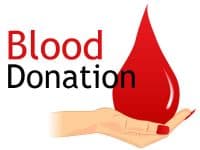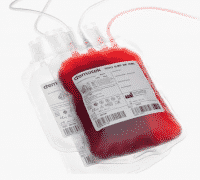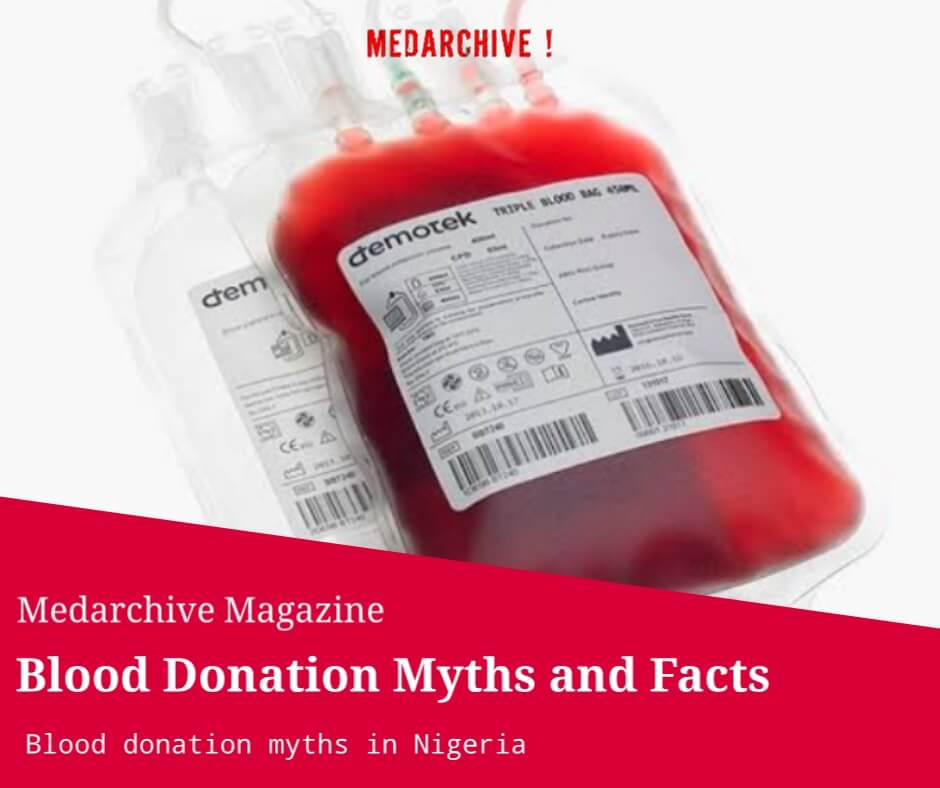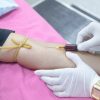People can be very superstitious in the way they perceive certain phenomena especially when it deals with human life and death. Over 60% of the population identify with a religious group. It is expected that something as important as blood donation will certainly have some myths associated with it. And in this post, we will be discussing these myths related to blood donation, and debunk some of them.
A lot of people have their personal reasons for refusing to donate blood or to refuse to accept blood transfusion even when critically ill.
Following a short outreach carried out among random residents of Enugu state in Nigeria, I found out some common myths related to blood donation which these people believe in. And of course, most of the beliefs are based on misconceptions that they have about blood donation because they completely don’t understand how blood donation works.
Other people I met are bound not to donate blood because of some socio-cultural reasons which are perfectly understandable since it is what they believe in.
Table of Contents
- The 13 Common Myths Related To Blood Donation
- Myth 1: I don’t have enough blood:
- Myth 2: Donating Blood takes so much time (I don’t have time to waste):
- Myth 3: I will get a disease from donating blood:
- Myth 4: Other People’s blood is enough:
- Myth 5: The blood bank will sell my blood:
- Myth 6: My blood type is rare, so they don’t really need it:
- Myth 7: Women don’t donate blood:
- Myth 8: I just got my ears pierced
- Myth 9: My blood will finish:
- Myth 10: The process hurts so much, I might even die:
- Myth 11: I can’t donate, I am on medication:
- Myth 12: I have donated once this year:
- Myth 13: I have tattoos:
- Fact 13:
- Final thoughts on the Blood Donation Myths and Facts!
The 13 Common Myths Related To Blood Donation

Some of the blood donation myths and facts include:
- Myth 1: I don’t have enough blood
- Myth 2: Donating Blood takes so much time
- Myth 3: I will get a disease from donating blood
- Myth 4: Other People’s blood is enough
- Myth 5: The blood bank will sell my blood
- Myth 6: My blood type is rare, so they don’t really need it
- Myth 7: Women don’t donate blood
- Myth 8: I just got my ears pierced
- Myth 9: My blood will finish
- Myth 10: The process hurts so much, I might even die
- Myth 11: I can’t donate, I am on medication
- Myth 12: I have donated once this year
- Myth 13: I have tattoos
Myth 1: I don’t have enough blood:
This blood donation myth might sound very funny. But actually, some people just conclude that they are not eligible for blood donation because they do not have enough blood. And what is funnier is that they arrive at this conclusion and believe it strongly even without going for any laboratory investigation or blood tests.
One major thing that feeds this myth is that people think that they have fewer blood cells if they are thin or if they are not muscular, and believe that bigger or heavier people have more blood.
Fact 1:
Every healthy adult has about 4.5 to 5.5 liters of blood in their body. And what is required from such a person is just about one pint of blood. And a pint of blood contains approximately 450mls of blood. So on average, a donor who gives just a pint loses only about one-tenth of his total blood volume.
In a similar way, the normal range of hemoglobin in a healthy male is about 13-17 g/dl and a healthy female; 11-15 g/dl. And a pint of blood reduces hemoglobin level only by 1g/dl.

Before one is tagged eligible for blood donation, a series of tests are carried out by the blood bank to ensure that the person meets these requirements. So the argument of not having enough blood is invalid until proven otherwise by the test results from the blood bank lab. You just need the confidence to go and check for eligibility.
Also, our people who are fat or bigger in size do not necessarily have more blood than their slim counterparts. But once you have an optimum hemoglobin level and body mass index based on the lab tests in the blood bank, then you can donate blood.
Myth 2: Donating Blood takes so much time (I don’t have time to waste):
This is another misconception people have about blood donation in Nigeria. While this might be true in many parts of the country, it is actually faster in some places.
Fact 2:
Although the time it takes for one donor to complete a donation of one pint of blood is dependent on several factors. Like; the donor’s health history, the facility, the number of donors present, etc. From personal experience and research carried out in other facilities, the whole process does not last longer than 2 hours in a place where everything works fine. But 2 hours is all it takes to save at least one patient’s life. In my opinion, it’s worth it.
Myth 3: I will get a disease from donating blood:
Another blood donation myth is that some people believe that you will get infected whenever you donate blood. And the truth is that people dread blood transfusion-related infections.
Fact 3:
The whole process of blood donation in the most recognized facilities in Nigeria is absolutely sterile. In some cases, the attendants in the blood bank tend to give the voluntary donor the privilege of choosing the needle and even the blood bag to be used on them.
It is not totally impossible for one to get infected through the process, but in most facilities with trained lab attendants, this is only a myth as the necessary precautions for the prevention of disease transmission are taken. From wearing hand gloves, using spirit swabs to using brand new syringes.
Also, it is always the donor’s right to speak out when he/she feels like things are not done the right way.
Myth 4: Other People’s blood is enough:
Another myth related to blood donation is that some people believe that a good number of persons are donating blood, hence there’s no need for them to go and donate themselves.
Fact 4:
It is really sarcastic to think that everyone else is donating blood, therefore yours is not needed since theirs is enough.
Just as you are trying to overcome those blood donation myths, others are beclouded by their own misconceptions. So whenever you hear of that friend in need, it is always better to go first and see if you can help out.
Myth 5: The blood bank will sell my blood:

Also, one of the blood donation myths is that many people fear that the blood bank will sell their blood even when they donated out of their own free will, without any financial benefit in mind.
Fact 5:
This is a very serious offense. The blood banks in Nigeria have no right to sell your blood if you are a voluntary non-paid donor.
But just in case you suspect this, the best thing to do is to report to the person with the highest authority around. If you feel that the issue is not handled to your taste, you can report to the hospital authority or the highest authority in the healthcare facility.
If you also feel like the matter is not being handled well, then seeking legal counsel will be appropriate.
Myth 6: My blood type is rare, so they don’t really need it:
Another myth related to blood donation is that people who have rare blood types think that because their blood types are rare, then it would not be needed at all.
Can you see the paradox here? It is quite funny how people think that rare blood types like B negative and AB negative are not needed in the blood bank. It is actually the other way round. They are the most valued of all blood types in the blood banks.
Fact 6:
It is true that some blood types are rare. But red blood cells are not the only useful components of blood. Our blood has many other components like plasma, white blood cells, platelets which could be useful to patients.
Also, most modern facilities now have machines that can freeze these blood products for a very long time. So your blood may not be a waste after all.
In fact, a lot of people with these rare blood types engage in what is called autologous blood donation where they donate blood for themselves in case they get sick in the future.
Also, Read; Various Blood Type Charts, Blood Donation Charts, and Meanings.
Myth 7: Women don’t donate blood:
The 7th blood donation myth is that a lot of people believe that women should not donate blood due to their monthly menstrual cycles.
During the outreach, a lot of women and ladies actually believed that women do not donate blood.
They believed it is just for the men. Also, a lot do not donate because they are afraid because of the monthly blood losses they experience.
Fact 7:
Any human being above the age of 18 can donate blood irrespective of sex. But only as long as they meet the minimum requirement for blood donation in Nigeria.
Though it is advisable that women don’t donate just after their monthly loss.
Myth 8: I just got my ears pierced
Another myth related to blood donation is that people think that recent ear piercing is a contra-indication to blood donation.
Fact 8:
It is true you may not donate blood just after piercing your ear or else it is done in a non-regulated facility. In which case you will have to wait for about 12 months before you can do your eligibility test for blood donation.
NB: A non-regulated facility is facilities that are outside the hospital or healthcare setting. Regulated facilities are health care facilities like health centers, teaching hospitals, private hospitals, etc.
Myth 9: My blood will finish:
One of the blood donation myths I encountered was people who think that blood donation is a dead end. They believe that one can be exsanguinated during the process.
Fact 9:
Come on, it’s just a pint! (refer to Myth 1) Or else you have an underlying illness. In which case, you won’t be eligible for donation.
Myth 10: The process hurts so much, I might even die:
Yes, a lot of people believe that blood donation will result in lots of life-threatening complications. This blood donation myth has been preventing them from donating blood.
Fact 10:
Apart from the initial prickly sensation, the whole process of blood donation is apparently painless.
The fact is that there are not any side effects that arise from donating blood if it is properly done in a regulated facility. There is actually more to gain from donating blood than you lose.
Myth 11: I can’t donate, I am on medication:
Another blood donation myth is that some people believe that being on medications is a contraindication to blood donation.
Fact 11:
Being on some medications is not a contra-indication for blood donation. Rather, the underlying illness for the medication you are on could be. But It’s not your function to decide, it is left for the attendants at the blood bank.
Myth 12: I have donated once this year:
One of the myths related to blood donation is due to the fact that a lot of people do not know how often they can donate blood. Having donated blood within the last 12 months does not make you ineligible for blood donation.
Fact 12:
It takes approximately 120 days for one batch of blood to be regenerated. That is about 4 months. So you can comfortably donate blood 3 times a year as long as the interval of 4 months between each donation is maintained.
Myth 13: I have tattoos:
One of the most popular blood donation myths is that people with tattoos do not donate blood at all.
Fact 13:
You probably must have heard of celebrities who you think do not donate blood because of tattoos.
Now let’s clear this: A recent tattoo or ear piercing is only a contra-indication for blood donation if it was done in a facility, not under regulation. And in such cases, the donor is advised to stay for at least 12 months before coming back to test for eligibility.
Final thoughts on the Blood Donation Myths and Facts!
These are but a few blood donation myths and you can add your own in the comment section below. Or even add suggestions or counterarguments to the facts.
Even some persons who are somehow affiliated to the health care profession, even after being exposed to the facts about blood donation still see the process as an ordeal. This has been a big challenge and requires innovative ideas to make people feel comfortable donating blood.
So the question is; what is the real myth here?
After multiple interviews with some people regarding why they don’t donate blood, I figured that most are just beclouded by some unknown fear.
It could be likened to the first day we ever attempted to walk as a kid. For some people, it was just normal and like every other developmental milestone. But for others, their minds would never stop playing tricks and trying to remind them how that other baby broke a leg while attempting to take a second step.
But as soon as that first barrier is broken, it becomes like every other aspect of our life like eating food or even breathing.
In the same way, blood donation gets more comfortable after the first few successful attempts.
Other Posts You May Like:



